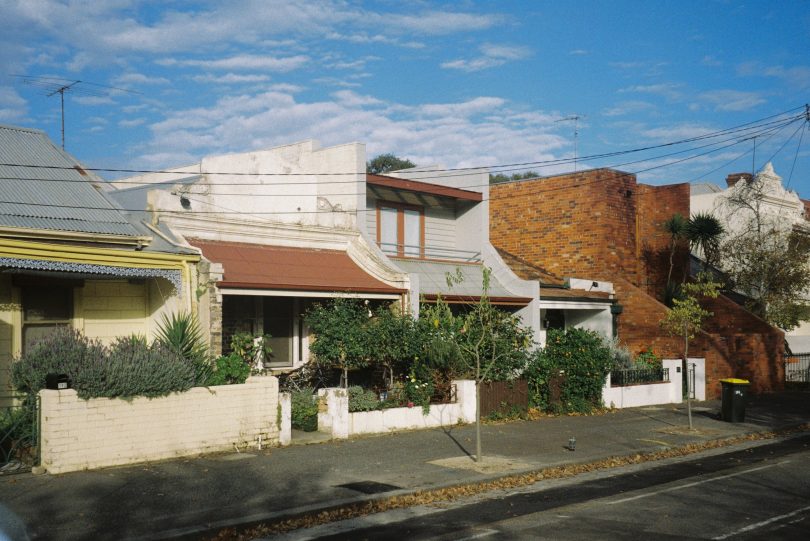Tune in to episode 10 of Under Cover podcast to hear the full story.
Lockdown laws introduced in March saw thousands of people around the country suddenly without income.
For those left out of the government’s support plan – the migrant workers, exchange students and backpackers who generate billions for Australia’s economy every year – the ground fell out beneath them.
In the interim between the shutdown of the hospitality industry and the implementation of the government’s coronavirus support packages, thousands of people were left asking, how could they afford rent?

Despite Scott Morrison’s call for landlords and tenants to “work it out”, there were reports of real estate agencies illegally advising tenants to pay rent out of their supers throughout April.
The Rent and Mortgage Strike Australia (RAMS) was formed in response to the desperate climate, initially as an online pledge calling for tenants to withhold their rent in solidarity with those who couldn’t afford to pay.
At the time, a national rent strike seemed a viable route, and the initiative saw great success, receiving 17000 pledges in its first week. For many, rent striking was their only option.

Job losses during the pandemic saw people moving out of their rental properties, many to return home.
RAMS support networks were set up on Facebook for each of Australia’s states, allowing organisers to assist and respond to the many struggles, concerns and queries members had while they navigated the complicated task of approaching property managers, real estate agencies and landlords to ask for rent reductions.
Farida, one of the RAMS organisers, said the group’s foundation was a direct reaction to the complete lack of support offered by the government to people experiencing financial stress during lockdown, which was made frustratingly evident in Scott Morrison’s advice to tenants and landlords – “just sit down, talk to each other, and work it out”.
“The relationship between tenants, landlords and real estates is not ‘let’s just sit around a table and have coffee and talk it over’ – nobody living in the real world is going to be confident something like that would work,” she said.
“Scott Morrison and his government don’t live in the same world that the rest of us do, they’re clueless about what goes on.”

After losing their hospitality jobs, Emma and Leanne withheld their rent for the month of April. Their landlord offered a rent freeze three months later.
While the government’s advice to tenants and landlords was less than useful for many, it did mitigate the likelihood of a true, nationwide rent strike coming to fruition.
Emma Boelts, an American exchange student who has lived in Australia on scholarship for three years, said her housemates withheld their rent in solidarity with her for the month of April, after they all lost their jobs in hospitality.
“My housemates were still waiting on their government support at that time, and I didn’t have any income at all. None of us knew what was going to happen, so we all withheld our rent,” she said.
“We sent a letter to our property manager explaining our situation and she offered to contact our landlord for us, but then, it was ridiculous – he didn’t even respond to her for three months.”
The government’s $550 supplement to Jobseeker (née Newstart) and student allowances did not come into effect until late April. Jobkeeper, also late to be implemented, did not apply to casual staff members, in a country where 25% of workers are casually employed.
Scott Morrison told foreign students, backpackers and migrant workers it was “time to go home”.
Chase Kauffman, a migrant worker, said he contacted his property manager immediately after his entire household was laid off, who promptly told him there was “no way” they would receive a rent reduction – they could move out if they weren’t happy to pay the full amount.
“I urged the property manager to ask the owner, who graciously provided us with a considerable rent reduction immediately on request, proving property managers don’t always give you the best response, they don’t always ask the owner or the landlord which options are available for tenants,” he said.
“We are just dollar signs to them.”

Both Farida from the Rent and Mortgage Strike Australia, and Ella from the Housing Defence Coalition emphasised “housing is a basic human right.”
In New South Wales, a flimsy rental moratorium saw a 60-day stop on evictions for rental arrears, however tenants could still be evicted on a “no grounds basis”, which effectively still allowed landlords to evict tenants who could not pay, just under a different name.
Ella, an organiser with the Housing Defense Coalition (HDC), said the group’s main focus had been preventing evictions as they occurred.
“Bargaining on your own against an institution as powerful as real estate and landlords won’t be as effective on your own. So we always emphasize that collective action would be the best strategy,” she said.
Ella said a huge success for the HDC was preventing the snap eviction of a woman named Layla in Sydney’s west, who had reached out to them when she was given two days’ notice to vacate.
“It was a very energizing moment for us, putting on pressure collectively and naming and shaming and saying, owning a house that has people inside of it is not just an investment. The way it’s set up may be to generate income but human beings live inside those homes.”
“Indigenous people in Australia know this well – the notion of private property under which the real estate market in Australia is built upon is the very same as the colonial state was built on,” she said.
“The HDC and leftist organisers are needed to draw the connections between what we’re seeing falling apart to what was already broken, and what the potential is for a better world.”
Featured image and photographs by Arielle Richards.






